The New Canadiana is a journalistic quest in search of the spirit of Canadian folk and country music right now. This year I’m interviewing one Canadian singer-songwriter each month. For previous issues, please visit the archive.
Our special guest this month, Darrel Cameron, is one of the six participants in this Spring’s edition of the City Kid Song Circle. We’ve been meeting for the past three months to workshop new material, and on April 3 at the Bus Stop Theatre we will be revealing these new songs to the city of Halifax. Tickets are $15.00 and available on Eventbrite. We hope to see you there!
I first met Darrel Cameron at one of Terra Spencer’s songwriting workshops last November. More than once that weekend he revealed something of the heart of music making to me. The first occasion was at the workshop’s kitchen party where I got to hear Darrel’s rich voice (somewhere between Johnny Cash and Bon Iver) and his timeless approach to song craft. The second was when my turn came to record a demo in Darrel’s makeshift recording studio where he guided me with attention and gentleness through capturing a complete vision of a song.
Darrel is well known and well loved in the Halifax music community. He has been recording and releasing music for over 15 years now, under his own name, under the moniker, Blue Acres, and in his ambient side-project, The Ocean Misses You. He is also an experienced music therapist and runs a recording studio where for the past five years he has been growing in reputation as a producer.
I was eager to get Darrel on the show both for his experience as a songwriter and a producer. This series has been seeking to encounter the meaning of music making in Canada, and relative to that end, I like to think of Darrel as something like an anthropologist who can give us a glimpse into the music as it is happening. After our conversation at the kitchen table, we hiked down to Point Pleasant Park to take some photos and capture a video of one of Darrel’s most beautiful songs. You can find that video below.
As always, be sure to follow, share, and enjoy the official New Canadiana playlist, which features a couple of Darrel’s songs as well as music by many of the other amazing artists we’ll be encountering this year.
Seeking the inner landscape
Matthew: One thing that really stands out to me about your project, Blue Acres, is how clear and unified its aesthetic vision is. There is this recurring set of images—the cold, snow, water, darkness, fading light, the colour blue. What do these things evoke for you and why do you keep coming back to them?
Darrel: I’m going for this mix between an ethereal, magical, spiritual type of inner landscape or emotional landscape paired with something really natural, grounded, and earthy. Those images really fit with that and hearing you say them back to me resonates a lot. I’m always looking for this feeling I get from certain music. I really love an organic, rough-around-the-edges sort of sound. But then I also love these reverb-y, ambient, otherworldly sounds.
Matthew: I'm starting to think that long subtle reverbs, especially on the vocal, are part of your signature sound, and it really does evoke that sense of inner landscape. What do things like coldness, snow, water, darkness, and so on evoke for you about the inner life?
Darrel: The first song on that album is called “Ember,” and it’s basically a poem format—there’s not really a chorus or anything like that. The song is about hibernation. Winter is coming, the leaves have fallen, and all the things you might have found comfort in before are going to sleep. The lyrics talk about finding yourself a little bit of a hollowed-out spot where you can lay down, pull your legs up to your chest, try to keep warm. The whole thing is saying that there’s an ember of light still within you, even in that moment.
Matthew: For me, that’s a profound image. I’m cold, so I huddle up for warmth, but what’s interesting to me is that in the end, in that posture, I am the one warming me—the warmth somehow comes from myself. How is that significant for you?
Darrel: There are themes in the record [Quiet Light, 2021] that point to a growth towards learning to trust yourself as your own support. I don't know if I would have articulated that before you asked the question. When dealing with anxiety or changes in life I’ve had to go through a period of learning to trust myself. Hibernation is a natural thing. Going through seasons is a natural thing.
Matthew: Another thing that occurs to me about these images of cold, snow, and darkness is that they all imply their contraries. They aren’t static spaces. This really comes out for me in your more recent song “Balmoral Falls” [2024].
Water is present there too, but this time it’s the moving water. And what strikes me about the song is that it starts with “Maybe”, as if it’s posing the question “Will I be able to attach myself to this larger natural motion?”
Darrel: For me that song is about trying something small to see if you can break out of a negative mental health headspace. It’s a hopeful “maybe”. Like, "What if we try?"—maybe I’ll try eating a little bit healthier today and see if that helps, maybe I’ll go for a drive, or “I forgot I have some friends I can text.” This song is about needing to remind myself of the small, simple maintenance things that help with anxiety and burnout. It’s a kind of despondent hope in that song.
From music therapy to music production
Matthew: I find that when my creative practices stop being an end in themselves—if I’m using them to accomplish other things, or if my relationship to them becomes one of utility rather than presence and stillness—then the well dries up in five seconds. Do you relate to that?
Darrel: I know what you mean, but I think I have a different sense of that now. Most of my work now is in production and working with other artists, supporting other people to make their music. There’s a lot of creativity I bring to that, but it’s more on the utilitarian side—using the skills I have to support someone else’s vision coming true. For me, right now, that’s the best thing in the world.
Matthew: You’ve mentioned to me before that you took a step back from your work as a music therapist to start doing music production full time. Is there a link between working with people in those contexts?
Darrel: I went through a period of burnout in my music therapy work, which is very common after 15 years of doing it. But production was always there since day one for me. That was what I always wanted to do, but I didn’t think I could, or I didn’t think it was possible or a smart idea. I just got to a point where I was like, “Well, what have I got to lose? If there’s a time, now’s the time.”
As a producer, I’ve found a new role that excites me. It’s a good fit for both my skill sets. The music therapy world—using those skills of working with people, listening well, helping them find their goals—and the creative side, where I bring my own sensibilities into the production process.
The human being behind the song
Matthew: One of the things these interviews have been about is what I’m calling “the spirit of songwriting,” and I’ve been excited to have you on the show because your day job now involves bearing witness to other people’s practice as songwriters. Is there anything you’ve learned about songwriting and artistry from that?
Darrel: I always try to look at what the person’s goal is for the song. Are they trying to submit it for sync licensing? Are they going to put it out on Spotify? Or is it a song for their grandkids for Christmas? Each of those purposes is just as valid to me. If people want to swing big—get their music into films or reach a huge audience—that’s just another approach. It changes the conversations we have and the decisions we make about the songs.
Matthew: So people come with different goals, but at the core, there’s always something human that deserves to be attended to and supported.
Darrel: Yeah. There’s value in the human being behind the song. Even if a song isn’t trying to be a commercial hit, it can still have a lot of meaning. If it matters to the person creating it, then it’s worth helping to bring it to life.
Matthew: Why do you think everyday people with regular jobs are so moved to create and share music, and even to spend money on that process, to hire someone like you?
Darrel: To be honest, and I’m not trying to be contrary, I actually think the bigger question is: why aren’t we all doing this more? Why isn’t this more common? Why do people make music? For me, it’s a compulsion. It’s beyond my control—if I don’t do it, I’m not well. Fighting that part of myself never goes well. I think a lot of people would be happier if there were more opportunities for creative expression and less elitism around it. Singing is one of those things people will make fun of you for. Writing a song is deeply vulnerable. And then there’s this “tall poppy” mentality—cutting people down if they start to stand out. There’s always this suspicion of, “Who is this person getting too big for their britches?” That kind of attitude keeps a lot of people from even trying.
Matthew: I know that for me, my default is to assume that the part of me that wants to make art and share it with people is silly and immature, something that needs to be kept in its place. But whenever I take a step out and advocate for that little kid inside who just wants to make music, I come to life.
Darrel: I really relate to that experience. I had that for a lot of years, and it’s been a process of transformation getting to a place where I actually allow that part of myself to be the front runner of my work life and decision-making. It always felt irresponsible or dangerous.
Matthew: I’m thinking now of what you said earlier—that the songs on Quiet Light are about turning towards trusting yourself. It’s so wonderful that as a producer, you have a chance to create and cultivate safe and nurturing spaces so that others can learn how to trust this part of themselves too.
The sound of a place
Matthew: One last question—what, for you, is the New Canadiana right now?
Darrel: I think it’s bigger than what I can answer. There’s a call for more political, protest-style music. I don’t know if I’ve heard it too much yet, but there’s definitely a call for it. Also, there’s a reckoning due with our identity as Canadians—how we think of ourselves in terms of our colonial history. It also might be a response to AI-generated music and the dominance of top 40s hits. People are moving toward something more natural, something with mistakes in it, something made by someone.
Matthew: I really resonate with that. What would it look like to slow down and listen to what is of a place?—music that responds to the needs of a place, or to the people who live in a place?
Darrel: I completely agree. That is exactly what folk music connects to.
Hear Darrel Cameron at the City Kid Song Circle Showcase!
Darrel will be one of the talented songwriters featured at our upcoming City Kid Song Circle Showcase on April 3 at the Bus Stop Theatre at 7:00pm in Halifax. It’s going to be a full-hearted kind of night and we would love to see you there. Seating will be limited, so be sure to get your tickets soon!
Get connected
🪕 Listen to my new songs, “Water in my Mind” and “The Grey Line.”
✉️ Send me an email.
🗨️ Leave a comment:

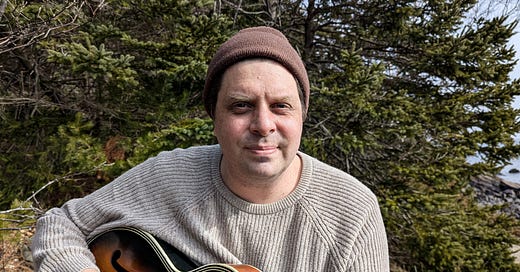



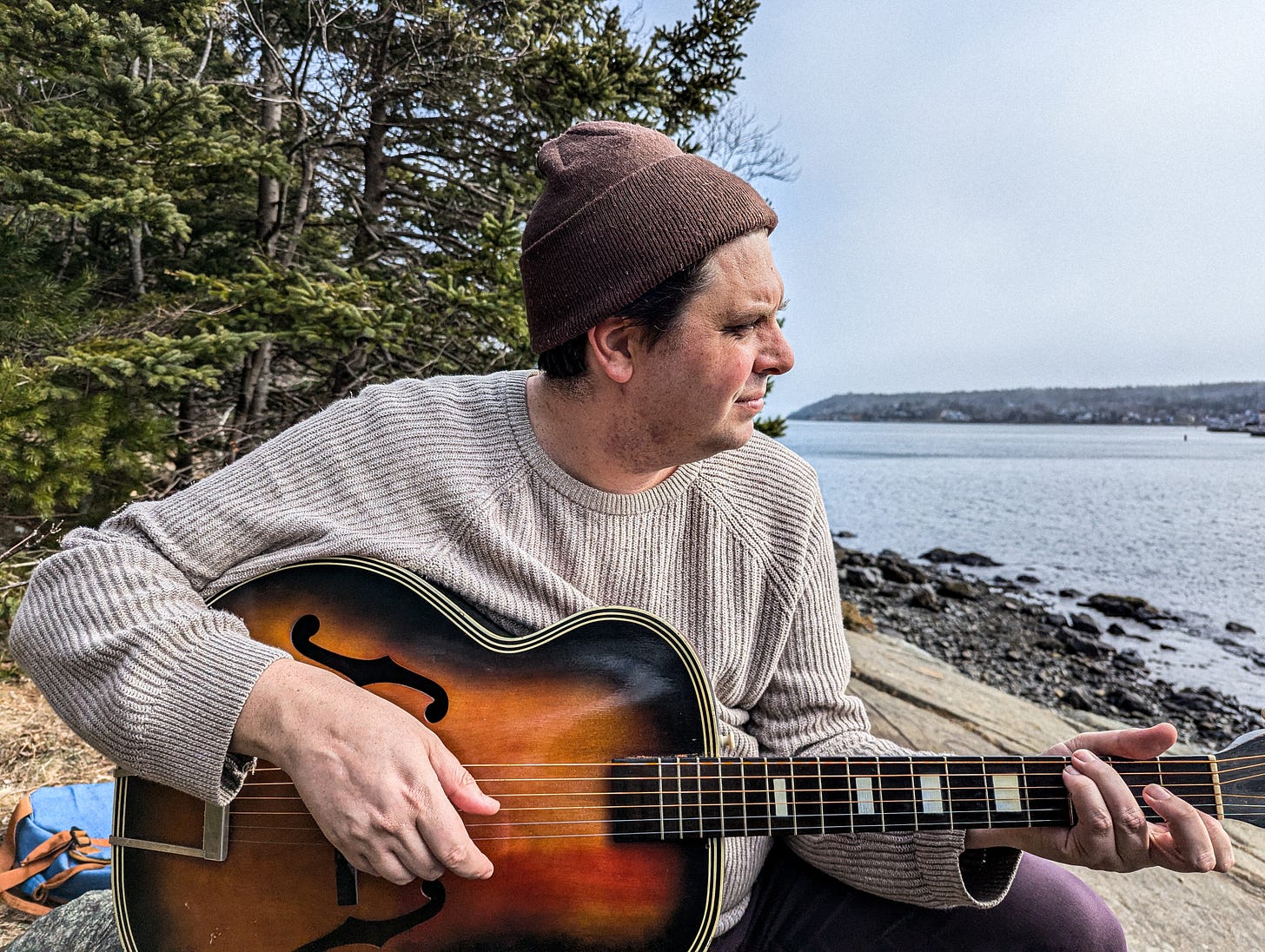
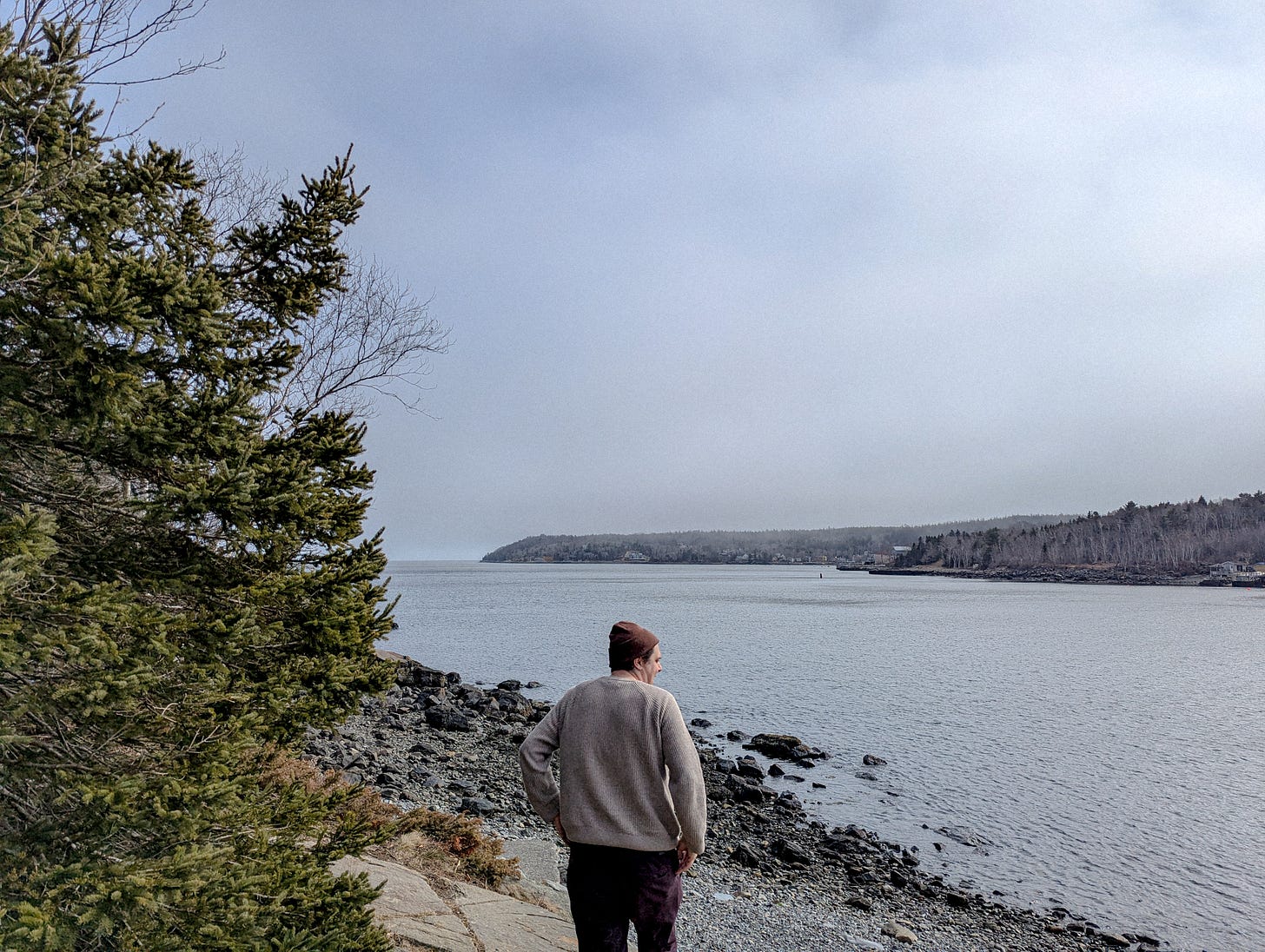
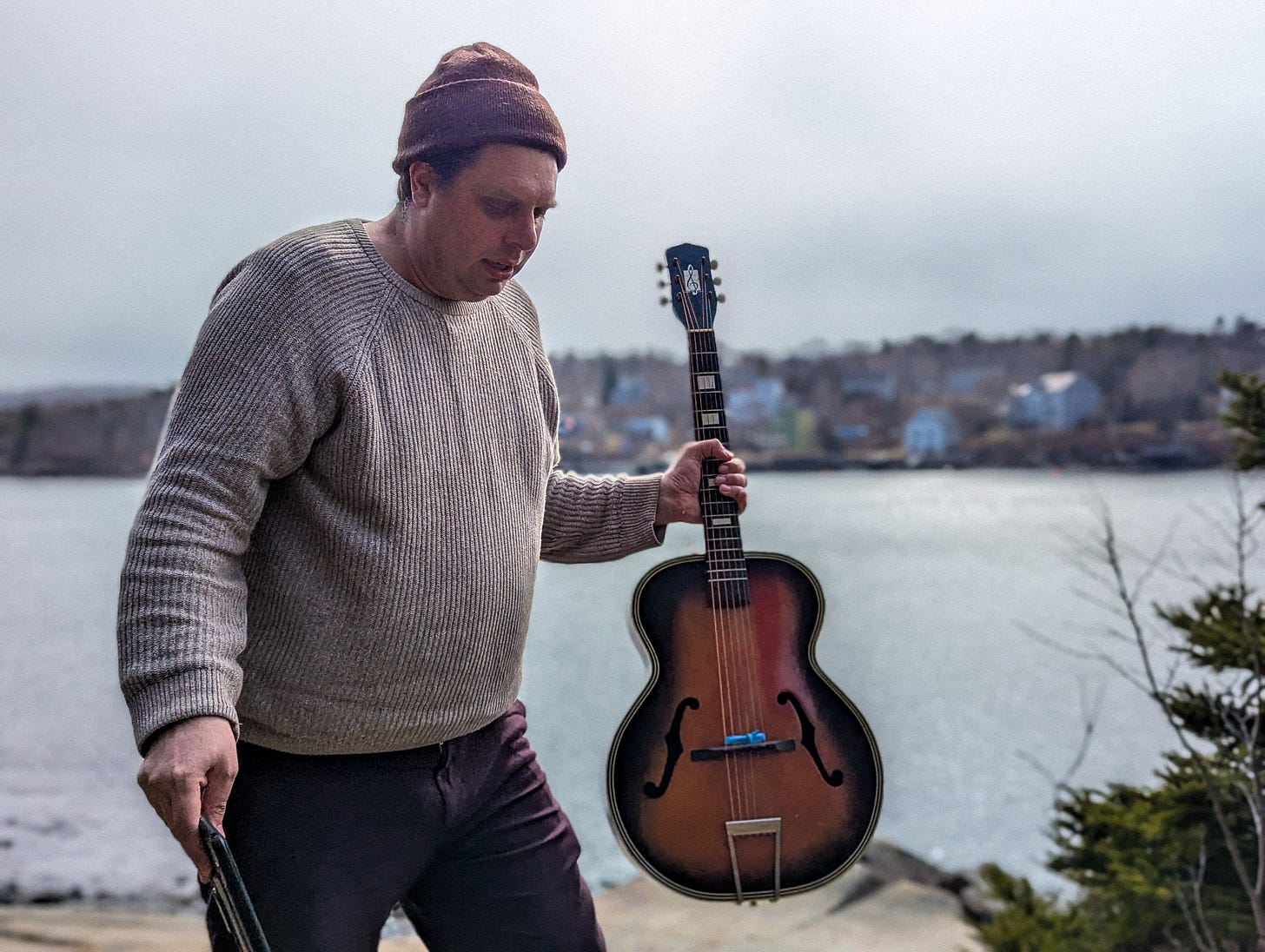
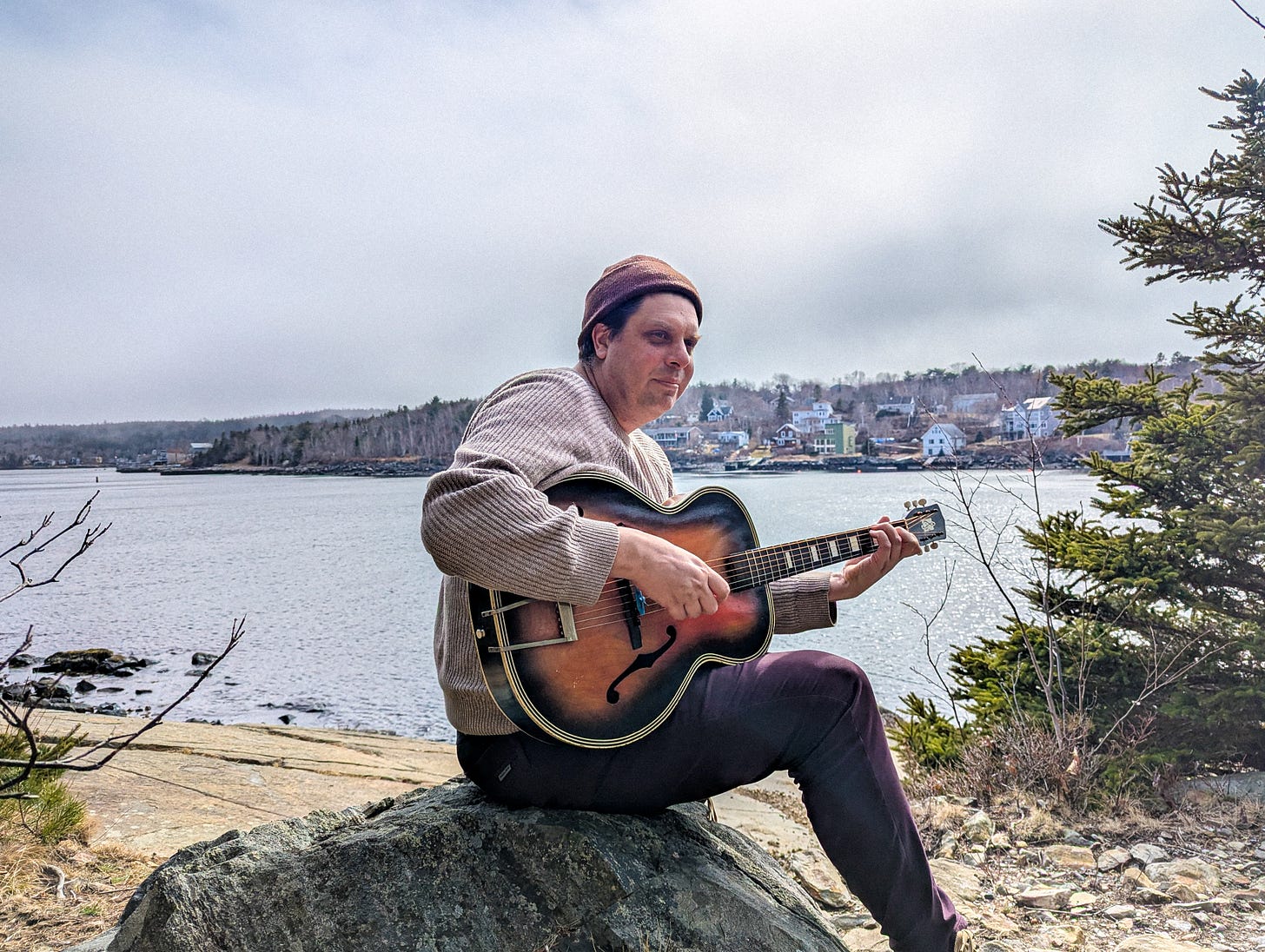

Great interview with one of the greatest people! Thanks for shining a light on Darrel - he is a special human. :-)